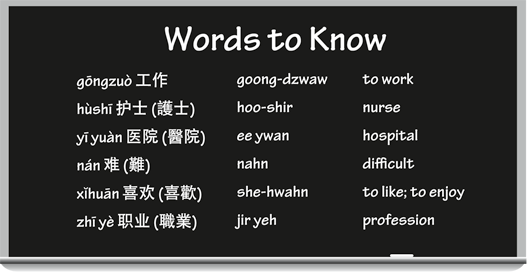Chinese For Dummies (43 page)
Read Chinese For Dummies Online
Authors: Wendy Abraham
The following are some useful job terms and job-related expressions:
 bà n rì gÅngzuò
bà n rì gÅngzuò
åæ¥å·¥ä½
(bahn ir goong-dzwaw)
(
part-time work
)
 gùyuán
gùyuán
éå
(
å±å¡
) (goo-ywan) (
employee
)
 gùzhÇ
gùzhÇ
é主
(goo-joo) (
employer
)
 jÄ«nglÇ
jÄ«nglÇ
ç»ç
(
ç¶ç
) (jeeng-lee) (
manage
r)
 mià nshì
mià nshì
é¢è¯
(
é¢è©¦
) (myan-shir) (
interview
)
 quán rì gÅngzuò
quán rì gÅngzuò
å
¨æ¥å·¥ä½
(chwan ir goong-dzwaw) (
full-time work
)
 shī yè
shī yè
失ä¸
(
失æ¥
)
(shir-yeh) (
unemployed
)
 In China, your
In China, your
dÄnwèi
åä½
(
å®ä½
) (dahn-way) (
work unit
) is an important part of your life. (This term refers to your place of work, which can be anywhere in the country. Your
dÄnwèi
is the group that's responsible for both taking care of you and being responsible for any missteps you happen to make.) In fact, when people ask you to identify yourself over the phone, they often say
NÇ nÇr?
ä½ åªå¿
? (
ä½ åªå
?) (nee nar?) (Literally:
Where are you from?
) to find out what
dÄnwèi
you belong to. Under Chairman Mao Zedong (the leader of the Chinese Communist Party, who founded the People's Republic of China in 1949), people were assigned jobs right out of high school and didn't even think of marrying until they knew the location of their assignment. A man could've been given a job in the northern hinterlands of China, and his fiancée could've been sent south â only to see each other once a year during the Chinese New Year. The
dÄnwèi
continues to provide housing for its employees and also enforces government policies, such as the one-child-per-family policy. As recently as 2003, you needed the unit's permission to get married, have a child, or receive any government benefits.
Talkin' the Talk
 Yáng and XiÇo Liú discuss their respective professions, which are quite different from each other. XiÇo Liú is a nurse in a city located in Henan Province, not far from the famed Shaolin Temple. (Track 9)
Yáng and XiÇo Liú discuss their respective professions, which are quite different from each other. XiÇo Liú is a nurse in a city located in Henan Province, not far from the famed Shaolin Temple. (Track 9)
XiÇo Liú:
Yáng, nÇ zuò shénme gÅngzuò?
yahng, nee dzwaw shummuh goong-dzwaw?
Yang, what kind of work do you do?
Yáng:
WÇ shì yÇnyuán.
waw shir yan-ywan.
I'm an actor.
XiÇo Liú:
Nà hÄn yÇuyìsi.
nah hun yo-ee-suh.
That's very interesting.
Yáng:
NÇ ne?
nee nuh?
How about you?
XiÇo Liú:
WÇ shì hùshì. WÇ zà i KÄifÄng dìyÄ« yÄ« yuà n gÅngzuò.
waw shir hoo-shir. waw dzye kye-fung dee-ee ee ywan goong-dzwaw.
I'm a nurse. I work at Kaifeng's No. 1 Hospital.
Yáng:
Nán bùnán?
nahn boo-nahn?
Is it difficult?
XiÇo Liú:
Bùnán. WÇ hÄn xÇhuÄn wÇde zhÃyè.
boo-nahn. waw hun she-hwahn waw-duh jir-yeh.
It's not difficult. I really like my profession.

Talking About Where You Live
After folks get to know each other through small talk, they may exchange addresses and phone numbers to keep in touch. That introductory question covered earlier in this chapter,
NÇ zhù zà i nÇr?
ä½ ä½å¨åªå¿
? (
ä½ ä¸»å¨åªå
?) (nee joo dzye nar?) (
Where do you live?
), may pop up. You may also want to ask a few of these questions:
 NÇde dià nhuà hà omÇ duÅshÇo?
NÇde dià nhuà hà omÇ duÅshÇo?
ä½ ççµè¯å·ç å¤å°
? (
ä½ çé»è©±è碼å¤å°
?) (nee-duh dyan-hwah how-mah dwaw-shaow?) (
What's your phone number?
)